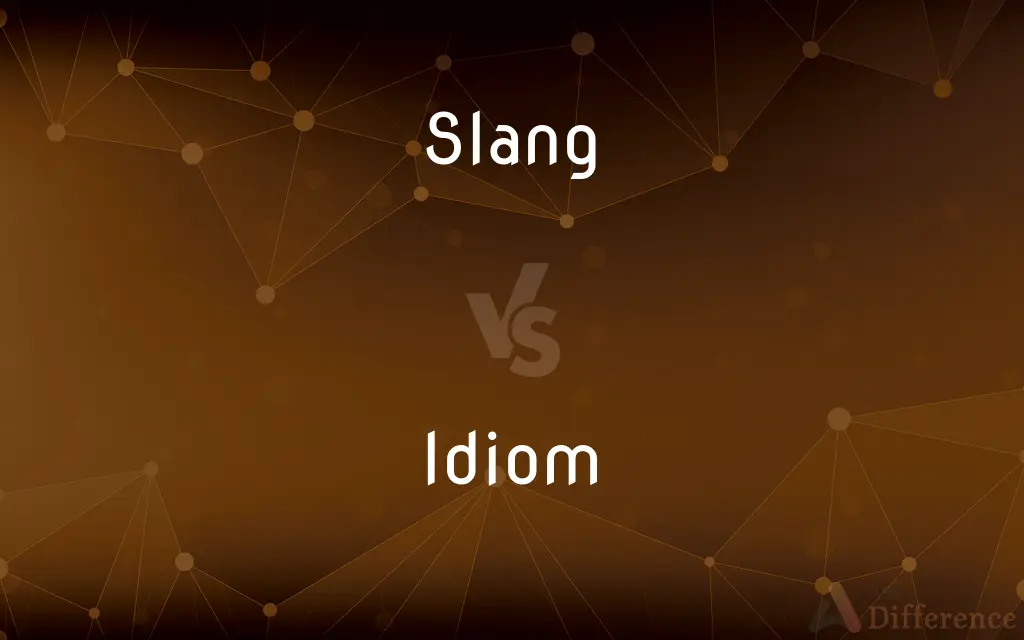Slang vs. Idiom — What's the Difference?
By Tayyaba Rehman & Fiza Rafique — Updated on March 8, 2024
Slang is informal, often ephemeral language, while idioms are established expressions with non-literal meanings.

Difference Between Slang and Idiom
Table of Contents
ADVERTISEMENT
Key Differences
Slang consists of informal, often trendy words or phrases used by specific groups, characterized by their dynamic nature and cultural specificity. Idioms, on the other hand, are established expressions where the meaning of the whole is different from the meanings of its individual words, and they are understood widely within a language.
Slang often reflects current trends, attitudes, and the social context of its users, making it subject to change over time. Idioms tend to be more stable over time, deeply ingrained in the language and understood by a wide range of speakers, even if they don't use them personally.
The use of slang can indicate group identity, showing membership in a particular social, age, or cultural group. Idioms, while also capable of signaling in-group understanding, are more universally recognized across a language and not limited to specific social groups.
Slang is frequently seen as less formal and can be inappropriate in formal contexts, whereas idioms are widely accepted in both informal and formal language, depending on the context and the idiom itself.
The understanding of slang may require knowledge of the specific context or culture it originates from, making it potentially confusing for outsiders. Idioms, while also potentially confusing for language learners, are more likely to be encountered in educational materials and taught as part of language learning.
ADVERTISEMENT
Comparison Chart
Nature
Informal, trendy language.
Established expressions with non-literal meanings.
Stability
Subject to change, ephemeral.
Relatively stable over time.
Usage
Indicates group identity, specific to certain groups or contexts.
Widely understood within a language, used across various contexts.
Formality
Often inappropriate in formal contexts.
Can be used in both informal and formal contexts, depending on the idiom.
Comprehension
May require specific cultural or contextual knowledge.
More universally recognized, though can be confusing for non-native speakers.
Compare with Definitions
Slang
Reflects current trends and social contexts.
Saying ghosting to describe someone suddenly cutting off all communication without explanation.
Idiom
Phrases where the overall meaning is different from the literal meaning of its words.
It's raining cats and dogs means it's raining very heavily, not that pets are falling from the sky.
Slang
Evolves quickly, with new slang terms emerging and fading regularly.
The word lit once meant something exciting or excellent, but its popularity wanes as new slang emerges.
Idiom
Often taught as part of language learning due to their prevalence and utility in communication.
Language learners might be taught idioms like Break the ice to describe actions that relieve social tension.
Slang
Often tied to particular regions, cultures, or communities.
Bodega has specific connotations in New York City, referring to a small convenience store.
Idiom
Part of the established lexicon, changing little over time.
Bite the bullet, meaning to endure a painful experience, has been used for centuries.
Slang
Outsiders or non-native speakers might find slang confusing or difficult to understand.
Someone unfamiliar with internet culture might not understand terms like troll or meme.
Idiom
Can be found in both casual conversations and more formal writings, depending on the idiom.
A penny for your thoughts can be used in casual conversation or in more reflective written contexts.
Slang
Signals belonging to a specific group, such as teenagers or certain subcultures.
Skaters might use the term gnarly to describe a particularly challenging or impressive skateboarding trick.
Idiom
Recognized and understood by a broad range of speakers within a language.
Kick the bucket is widely understood to mean someone has died.
Slang
Slang is language (words, phrases, and usages) of an informal register. It also sometimes refers to the language generally exclusive to the members of particular in-groups prefer over the common vocabulary of a standard language in order to establish group identity, exclude outsiders, or both.
Idiom
An idiom is a phrase or expression that typically presents a figurative, non-literal meaning attached to the phrase; but some phrases become figurative idioms while retaining the literal meaning of the phrase. Categorized as formulaic language, an idiom's figurative meaning is different from the literal meaning.
Slang
A kind of language occurring chiefly in casual and playful speech, made up typically of coinages and figures of speech that are deliberately used in place of standard terms for added raciness, humor, irreverence, or other effect.
Idiom
A group of words established by usage as having a meaning not deducible from those of the individual words (e.g. over the moon, see the light).
Slang
Language peculiar to a group; argot or jargon
Thieves' slang.
Idiom
A characteristic mode of expression in music or art
They were both working in a neo-impressionist idiom
Slang
To use slang.
Idiom
A speech form or an expression of a given language that is peculiar to itself grammatically or cannot be understood from the individual meanings of its elements, as in keep tabs on.
Slang
To use angry and abusive language
Persuaded the parties to quit slanging and come to the bargaining table.
Idiom
The specific grammatical, syntactic, and structural character of a given language.
Slang
To attack with abusive language; vituperate
"They slanged each other with every foul name they had learned from the age of three" (Virginia Henley).
Idiom
Regional speech or dialect.
Slang
Language outside of conventional usage and in the informal register.
Idiom
A specialized vocabulary used by a group of people; jargon
Legal idiom.
Slang
Language that is unique to a particular profession or subject; jargon.
Idiom
A style of artistic expression characteristic of a particular individual, school, period, or medium
The idiom of the French impressionists.
The punk rock idiom.
Slang
The specialized language of a social group, sometimes used to conceal one's meaning from outsiders; cant.
Idiom
A manner of speaking, a mode of expression peculiar to a language, language family, or group of people.
In English, idiom requires the indefinite article in a phrase such as "she's an engineer", whereas in Spanish, idiom forbids it.
Some of the usage prescriptions improved clarity and were kept; others that yielded discordant violations of idiom were eventually revised.
Slang
(countable) A particular variety of slang; the slang used by a particular group.
Idiom
(programming) A programming construct or phraseology that is characteristic of the language.
Slang
(countable) An item of slang; a slang word or expression.
Idiom
A language or language variety; specifically, a restricted dialect used in a given historical period, context etc.
In the idiom of the day, they were sutlers, although today they'd probably be called vendors.
Slang
(India) A curse word.
Idiom
An established phrasal expression whose meaning may not be deducible from the literal meanings of its component words.
She often spoke in idioms, pining for salad days and complaining about pots calling the kettle black.
Slang
Any long, narrow piece of land; a promontory.
Idiom
An artistic style (for example, in art, architecture, or music); an instance of such a style.
The idiom of the expressionists
Slang
A fetter worn on the leg by a convict.
Idiom
The syntactical or structural form peculiar to any language; the genius or cast of a language.
Idiom may be employed loosely and figuratively as a synonym of language or dialect, but in its proper sense it signifies the totality of the general rules of construction which characterize the syntax of a particular language and distinguish it from other tongues.
By idiom is meant the use of words which is peculiar to a particular language.
He followed their language [the Latin], but did not comply with the idiom of ours.
Slang
A counterfeit weight or measure.
Idiom
An expression conforming or appropriate to the peculiar structural form of a language.
Some that with care true eloquence shall teach,And to just idioms fix our doubtful speech.
Slang
A travelling show, or one of its performances.
Idiom
A combination of words having a meaning peculiar to itself and not predictable as a combination of the meanings of the individual words, but sanctioned by usage; as, an idiomatic expression; less commonly, a single word used in a peculiar sense.
It is not by means of rules that such idioms as the following are made current: "I can make nothing of it." "He treats his subject home." Dryden. "It is that within us that makes for righteousness." M. Arnold.
Sometimes we identify the words with the object - though by courtesy of idiom rather than in strict propriety of language.
Slang
A hawker's license.
Idiom
The phrase forms peculiar to a particular author; as, written in his own idiom.
Every good writer has much idiom.
Slang
A watchchain.
Idiom
Dialect; a variant form of a language.
Slang
To vocally abuse, or shout at.
Idiom
A manner of speaking that is natural to native speakers of a language
Slang
To sell especially illegal drugs.
Idiom
The usage or vocabulary that is characteristic of a specific group of people;
The immigrants spoke an odd dialect of English
He has a strong German accent
Slang
Any long, narrow piece of land; a promontory.
Idiom
The style of a particular artist or school or movement;
An imaginative orchestral idiom
Slang
A fetter worn on the leg by a convict.
Idiom
An expression whose meanings cannot be inferred from the meanings of the words that make it up
Slang
Low, vulgar, unauthorized language; a popular but unauthorized word, phrase, or mode of expression; also, the jargon of some particular calling or class in society; low popular cant; as, the slang of the theater, of college, of sailors, etc.
Slang
To address with slang or ribaldry; to insult with vulgar language.
Every gentleman abused by a cabman or slanged by a bargee was bound there and then to take off his coat and challenge him to fisticuffs.
Slang
Informal language consisting of words and expressions that are not considered appropriate for formal occasions; often vituperative or vulgar;
Their speech was full of slang expressions
Slang
A characteristic language of a particular group (as among thieves);
They don't speak our lingo
Slang
Use slang or vulgar language
Slang
Fool or hoax;
The immigrant was duped because he trusted everyone
You can't fool me!
Slang
Abuse with coarse language
Common Curiosities
Why is slang often used by younger generations?
Slang reflects current trends and attitudes, making it appealing for younger people who are often at the forefront of cultural shifts.
Are idioms used in formal writing?
Some idioms can be used in formal writing, but their appropriateness depends on the context and the specific idiom.
Can slang become an idiom?
While rare, some slang terms may become widely accepted and stable over time, transitioning into idioms.
Is it important to understand idioms in a language?
Understanding idioms can significantly enhance comprehension and fluency in a language, as they are commonly used in communication.
What is slang?
Slang is informal language, often used by specific groups, characterized by trendy and ephemeral terms.
What is an idiom?
An idiom is a fixed expression with a meaning that cannot be deduced from the individual words.
How do non-native speakers learn slang?
Non-native speakers often learn slang through immersion in the culture, media consumption, and social interactions.
Can slang vary within the same language?
Yes, slang can vary widely across different regions, cultures, and communities within the same language.
Why might some idioms be confusing for language learners?
Idioms often contain cultural nuances and historical references that may not be immediately clear to those not fully immersed in the language's culture.
Are idioms always easy to understand for native speakers?
While idioms are widely recognized, some may be confusing or unknown to native speakers, especially if they are region-specific or outdated.
How does slang reflect cultural changes?
Slang evolves with cultural trends, social attitudes, and technological advancements, making it a reflection of current societal norms.
What role do idioms play in communication?
Idioms enrich communication, allowing speakers to express complex ideas succinctly and with cultural depth.
How do idioms contribute to language richness?
Idioms add depth and color to a language, enabling expressive and nuanced communication that resonates with cultural and historical contexts.
Can understanding slang help in language learning?
Yes, understanding slang can provide insights into cultural nuances and enhance conversational fluency in a language.
Is there a universal slang that everyone understands?
Due to its nature, slang is not universally understood and can greatly vary even among speakers of the same language.
Share Your Discovery

Previous Comparison
Flower vs. Inflorescence
Next Comparison
Merchandising vs. MarketingAuthor Spotlight
Written by
Tayyaba RehmanTayyaba Rehman is a distinguished writer, currently serving as a primary contributor to askdifference.com. As a researcher in semantics and etymology, Tayyaba's passion for the complexity of languages and their distinctions has found a perfect home on the platform. Tayyaba delves into the intricacies of language, distinguishing between commonly confused words and phrases, thereby providing clarity for readers worldwide.
Co-written by
Fiza RafiqueFiza Rafique is a skilled content writer at AskDifference.com, where she meticulously refines and enhances written pieces. Drawing from her vast editorial expertise, Fiza ensures clarity, accuracy, and precision in every article. Passionate about language, she continually seeks to elevate the quality of content for readers worldwide.














































